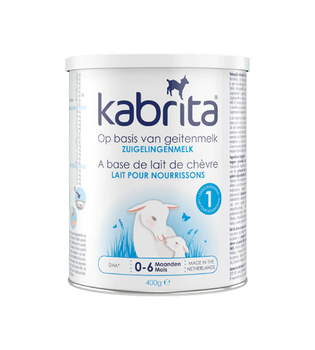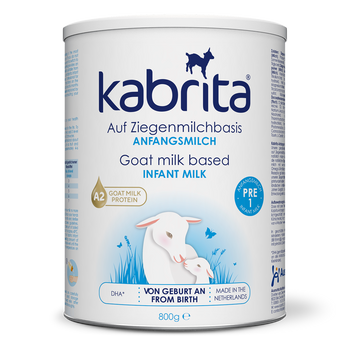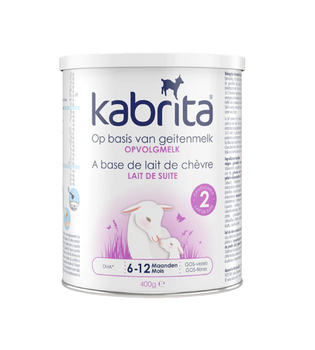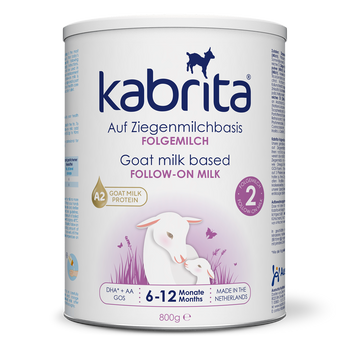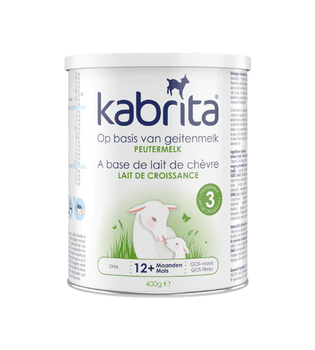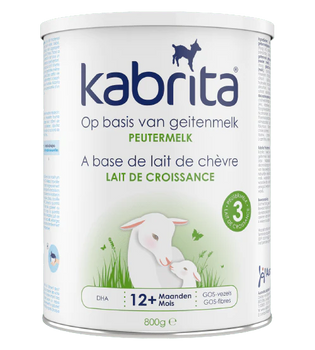FAQ Category: General
The composition of baby formulas is highly regulated by the CODEX. As these regional and national authorities don’t always apply the same criteria, there may be slight differences in the recipes in different countries.
Of course you can always be certain that the Kabrita formula sold in your market complies with the latest nutritional insights as well as relevant local legislation.
Kabrita is derived from the Spanish word ‘Cabrito” which means little goat or kid.
Kabrita's infant and toddler formulas have been developed to offer a healthy alternative based on goat milk that meets the average nutritional requirements at a certain age. As each baby is unique with its own, individual growth and development process, we advise you to establish how and when you can best use Kabrita in consultation with your doctor (the health professional who is closely involved in this growth process).
Kabrita is a division of Ausnutria Nutrition. This dairy group is comprised around three well-known dairy and baby and infant formula production facilities in the Netherlands. The company has a rich history in the development and production of baby and toddler formulas.
Ausnutria Ommen was established in 1897 and is responsible for the production of high-quality goat milk powder and other dairy ingredients. Ausnutria Kampen and Lypack Leeuwarden have been producing baby formula since 1936. Over the years, we have produced baby and infant formula for numerous other brands at our production facilities, including a number of renowned, leading global brands.
We do not recommend that you use products whose Best Before date has expired. The effect of the nutrients (e.g. vitamins) may decline after the Best Before date has expired.
The easiest way to check if you have an original Kabrita product is to look at the code on the base of the tin*. This code is linked to our production facility and should read: NL Z0238 EC, NL Z4057 EC or Pluto NL Z4056 EC.
*Attention: In China this code is not stated on the base of the tin, but on the side. In Russia this code is not stated at all due to local legislation.
No, Kabrita has a surprisingly pleasant smell and taste. The fast production process of the fresh goat milk creates a fresh and gentle, mild taste, comparable to the flavour of cow milk-based formula.
*Just like other follow-on milk formulas.
Mother's milk is best for your baby. However, if you are thinking about switching to follow-on milk or toddler milk, you can consider using Kabrita goat milk formula. Kabrita offers goat milk follow-on milk and toddler milk of exceptional quality. This is the result of decades of experience with bottle formulas and the outstanding quality of Dutch goat milk. Goat milk is naturally gentle and mild and forms a good basis for infant formula. Kabrita combines the natural mildness of Dutch goat milk with valuable nutrients such as goat whey protein, DHA Omega-3 fatty acids * and dietary fibres.
Kabrita complies with the regulations for infant formula and is a safe and complete alternative based on goat milk, and suitable for every healthy baby.
*Just like other follow-on milk
Yes, Kabrita is a safe alternative for every healthy baby. The use of goat milk as a basis for infant formula has been approved and found to be safe *. Just like fresh cow milk, fresh goat milk contains too much protein and not all the nutrients that are vital for your child's development. The content of nutrients in all formulas - including Kabrita - have been optimally adapted and supplemented to ensure your child gets exactly the right amount of nutrients that he or she needs.
Kabrita complies with local legislation and regulations.
*Just like other follow-on milk
No, Kabrita is not available in trial packages. We do not believe that the effect and success of a new type of formula can be assessed based on just one or two feeds.
Kabrita products are available in various countries, directly or through our distributors. Please check our world map for more information about Kabrita’s sales points.
The packaging has been changed, due to a new design of the tins, the word Gold has been removed from the packaging. This applies to all countries where Kabrita is sold.
With this change, the composition has also been slightly adjusted due to new EU legislation. This EU legislation is based on the latest scientific developments. The following minor adjustments have been applied to the recipe: Protein slightly down. Fat content slightly up Lactose up a little DHA and AA quite a bit up. Vitamins and minerals adapted to the new EU legislation.
No. Kabrita is not reimbursed by health insurance providers.
Our goats are fed a mixture of feeds, including:
• Straw
• Hay
• Grass (fresh)
• Silage grass
• Maize silage
• Pulp
• Pellets * (pelletised raw materials e.g. cereals such as wheat and barley, but also soy hulls, etc.)
These feeds are often available on the farm. In nature, however, the diet available to the goats is more limited. Goats eat grass, leaves and branches of bushes and trees, depending on what is available. Our farmers supplement the diet fed to the goats as much as possible. They provide feed that contains the necessary energy, protein, vitamins and minerals. This has a positive impact on the health of our goats and the milk they produce. A very important part of their diet is water. A typical milk goat drinks about 10 litres of water per day.
As soon as baby goats are born, they drink milk from their mother. Whether they can drink themselves or whether the goat is milked for them depends on how fast they are able to drink. They are always given colostrum from their mother.
